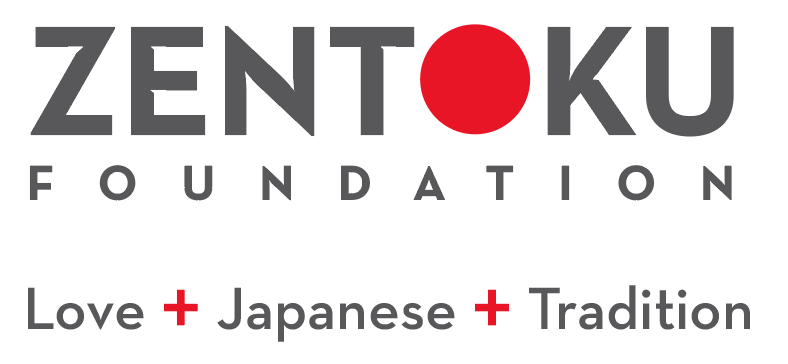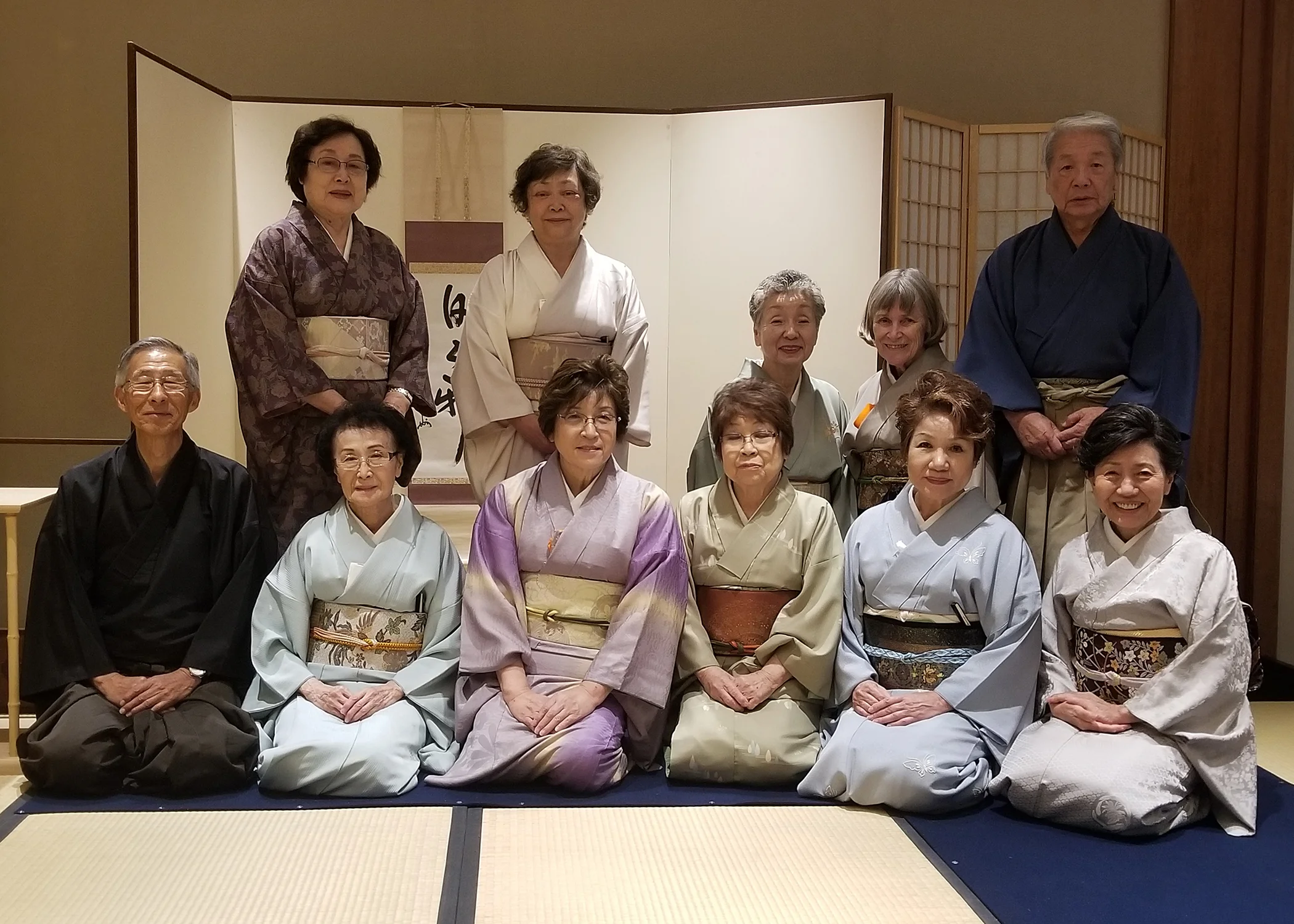Madame Yuriko Soyu Tanaka: “Tea is my life.”
By Teresa Watanabe
Madame Yuriko Soyu Tanaka sat under folded legs on pristine tatami mats, perfectly posed in a pastel silk kimono as she watched her student make tea.
She was playing the role of honored guest, but she noted her student’s every move: the way Sachiko Okazoe entered the room with tea utensils and bowed. The way she wiped the tea container with a silk cloth then folded it precisely. How she rinsed the bamboo whisk and inspected it for flaws, warmed the tea bowl, mixed the powdered green tea with hot water and served it.
There were many other steps, including admiring the beauty of the presentation. The tea bowl, utensils, scroll and flowers were particularly chosen for the cherry blossom season of spring.
Soyu Tanaka has demonstrated the tea ceremony countless times – on this day, at the Hanamatsuri Festival at the Orange County Buddhist Church -- and won acclaim for preserving and sharing Japanese culture. The tea master of the Omotesenke School has studied tea for six decades, trained about 100 students and shared the 500-year quintessential Japanese art form at festivals and other cultural gatherings, schools, universities and even an anime exhibition.
The ancient art offers rich lessons for modern society, the tea master said. The ceremony is not about ritualistic steps to mix hot water with powdered tea. It is a life path of deep spiritual values -- “wa, kei, sei, jaku” – or harmony, respect, purity, and tranquility.
Among these values, Soyu Tanaka said, her most cherished is wa, or harmony.
“You have to have peace in this world. You have to have harmonious relationships,” Soyu Tanaka said. “There are human conflicts in any society but doing tea will calm you, even when you’re angry.”
Her longtime students agree.
Fred and Yuriko, 1954
Kathy Keller has studied with Soyu Tanaka since 1982. She first learned tea in Japan, where she lived for two years when her husband, an engineer with McDonnell Douglas, was transferred there to work with Japanese counterparts on rocket guidance systems. When Keller returned to Southern California, she wanted to continue her studies and connected with Soyu Tanaka.
Keller said she initially regarded the tea ceremony as formulaic, in part because her teacher in Japan spoke no English other than “one, two, three.” But Soyu Tanaka, she said, is particularly good at explaining the hows and whys of tea ceremony, helping her understand the reason for every movement.
“It’s very peaceful, almost contemplative,” Keller said of tea. She added that performing the tea ceremony helped comfort and calm her after her father-in-law passed away.
Mary Nakayama, another longtime student, said it takes a least a decade to get a feel for the tea ceremony. “You can’t learn it in one visit,” she said
Indeed, Soyu Tanaka said she is still learning about tea even six decades after first starting her lessons. In part, that’s because the ceremony encompasses not only tea but interweaves into it other cultural arts -- ikebana, calligraphy, ceramics and food. In that sense, she said, tea is the richest and broadest of all of Japan’s traditional cultural arts.
“Even if you study and study, there is no end,” she said. “It’s a lifelong pastime.”
Fred and Yuriko Wedding, 1957
Soyu Tanaka was born in 1933 in Miyagi prefecture, the eldest of five children born to Koji and Matsuo Sato. After graduating from Meiwa Women’s Junior College in Sendai City, she began taking classes deemed at the time proper training for brides, including tea ceremony, ikebana, cooking and dressmaking.
In 1957, she married Fred Kiyoshi Tanaka, a childhood friend. Fred, a Nisei, had moved to Japan when he was 10 with his family on the last ship from Los Angeles before war broke out between the two countries in 1941. Soyu Tanaka was eight. Their families were friends from the same prefecture and often visited each other’s homes.
Was there a childhood crush? The tea master laughed. “We were like siblings,” she said. “Always fighting.”
Fred returned to Southern California in 1952 but was soon drafted into the U.S. Army’s Military Intelligence Service, where he studied Korean and was dispatched to Japan to serve as an interrogator during the Korean War. The friends reunited and decided to marry after her father declared Fred a known quantity and “nice boy.”
The couple moved to Anaheim in 1957, where Fred worked as a gardener. Soyu Tanaka said she struggled with homesickness, frail health and English, which she couldn’t speak. Fred’s family knew a tea ceremony teacher -- Madame Sowa Hitomi, founder of the Omotesenke School of Tea in Los Angeles – and Soyu Tanaka signed up to study with her.
“I went to Hitomi sensei so as not to be lonely,” Soyu Tanaka recalled. “I couldn’t work. I couldn’t speak English. I couldn’t do anything but tea. It really was my only enjoyment so I threw myself into studying it.”
Yuwakai group
Sowa Hitomi suggested her student begin offering lessons in Orange County, where the Omotesenke School had no chanoyu teachers. Soyu Tanaka received her teaching credential in 1973 and began sessions at her Anaheim residence, which features a tea room complete with tatami mats and an alcove, called tokonoma, displaying a calligraphy scroll and flower arrangement. She organized her own tea group known as Yuwaikai and, in 1988, received the highest professional ranking from the Omosenke headquarters in Japan. Only about 20 or 30 other teachers in Southern California have attained that mastery.
2018 Pioneer Spirit Award and Certificate of Recognition
For her leadership in spreading the Japanese cultural art and promoting U.S.-Japan friendship, Soyu Tanaka has received a host of awards. They include honors from the Omotesenke Headquarters and, in 2015, a Commendation of Honor of the 70th anniversary of the end of WWII from the Foreign Ministry of Japan.
She also has been honored by the Los Angeles mayor’s office, Los Angeles County Board of Supervisors and various community organizations for her wide-ranging volunteer work, which includes visiting the elderly and infirm at Keiro, working Nisei Week rummage sales and raising money for the needy. She has been active with the Japanese Women’s Society of Southern California, Orange County Buddhist Women’s Assn., Orange County Buddhist Church and Orange County Japanese Cultural Assn.
Today, she enjoys spending time with her family – Fred, her son Thomas and daughter Karen Uyematsu and five grandchildren.
She is no longer taking new students. But she still actively teaches about 10 of her longtime followers and cannot imagine life without tea.







